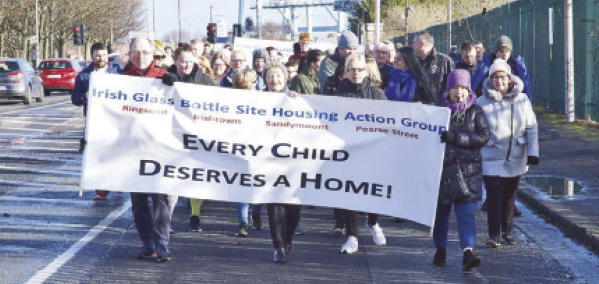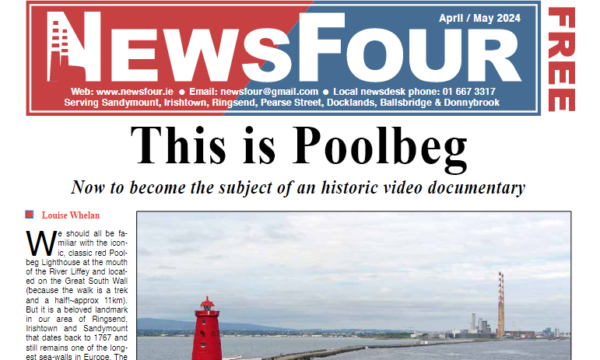
By Peter McNamara
On Saturday March 3rd over a hundred members of the Irish Glass Bottle Housing Action Group gathered along Sean Moore road, in front of the high metal barriers of the Poolbeg West Strategic Development Zone (SDZ).
The SDZ, also known as the ‘Glass Bottle Site’, after the Glass Bottle Company which operated here for many years, has been a scene of much controversy.
The Housing Action Group were protesting in defence of the housing deal for the site, which, despite being signed off on by all interested parties in May 2017, now seems in jeopardy of being fundamentally revised or scrapped altogether.
That agreement called for compromise and trust on all sides. It would appear this trust has been broken. As things stand, the 900 social and affordable units promised to local councillors and residents might be reduced, or out-sourced from the area altogether.
The demonstration on March 3rd began with impassioned speeches from Action Group members. Susan Cummins gave her interpretation of the position of Dublin City Council, the receiver Deloitte, and the current Fine Gael government.
“You’re too poor to live in your own community,” she told the crowd, “so get out. It doesn’t matter if you work hard and pay your taxes. You can’t live here.”
The Irish Glass Bottle Housing Action Group have been very active of late. Their recent “Pillow Case Protest” saw local children drawing messages on pillow cases to Housing Minister Eoghan Murphy. The cases were then tied to the metal railings of the SDZ along Sean Moore Road. They are calling it Minister Murphy’s ‘wall of shame’.
At the demonstration on March 3rd, the sight of the white cotton cases flapping against the spiked industrial barriers, carrying their hand-written pleas from the children to Minister Murphy, did much to convey the suffering of the most innocent victims of Dublin’s housing crisis, and the urgency of the Action Group’s work.
The speeches were followed by a march down Sean Moore Road. In a thick column, demonstrators chanted and shouted, and won countless beeps of support from passing motorists.
On hand that morning was Kevin Humphries of Labour, Jim O’Callaghan of Fianna Fáil, and Chris Andrews of Sinn Féin, to name a few. The march continued down Irishtown road, around Ringsend library, and onto Thorncastle Street.
As demonstrators passed the Ringsend Community Centre, the luxurious Canal Dock development – with its €20,000 a month penthouse apartments – could be seen looming high overhead. The demonstration crossed to The Point roundabout, before rounding back toward the SDZ. The chanting and cheering – and supportive beeping – remained constant.
In summer 2017 this matter seemed settled. After persistent calls from local communities and city councillors, an agreement was reached between then Housing Minister Simon Coveney, councillors, Dublin City Council officials and the NAMA-appointed receiver, Deloitte.
When the SDZ was first outlined by the Dublin Docklands Authority in 2012, it was comprised of a 75% commercial and 25% housing mix, with the housing units capped at 2,500. During the 2017 negotiations, the receiver Deloitte sought permission to build 3,500 housing units. In turn, local councillors, on behalf of their constituents, demanded an increase in the social and affordable housing allocation on the site, from the legislated 350 units (10% of the total) to 900 units (over 25% of the total).
Some people and councillors called for 50% social and affordable units on the site – their area would be faced with 10 years of extensive building works, and increased pressure on local amenities from an incoming population of nearly 7,000.
In the end, councillors passed a motion in May 2017 to lift the SDZ cap in return for increased units priced in the reach of local people. The plan was approved by An Bord Pleanála. The only thing left to do was start building.
In April 2018 the situation changed. David Carson, on behalf of Deloitte, lodged an appeal with An Bord Pleanála against the 25%+ allocation of social/affordable housing. In clear disregard for the understanding reached with councillors, Carson is insisting on no more than the 10% allocation required by legislation.
Unsurprisingly, councillors were shocked, and threatened to withdraw their support for any deal, which would delay building on the SDZ for several more years.
In order to salvage some deal for the site, Dublin City Council and Deloitte have been negotiating for the last few months, in parallel with Deloitte’s An Bord Pleanála appeal. Little is known about the scope and content of these negotiations. The Glass Bottle Housing Action group has been following the situation as best they can.
According to Susan Cummins, a key member of the Housing Action Group, people are worried. “We could have a decision any day. And we’ve no idea what’s happening. We could be cut back to 10%, or we could get no affordable housing on the site at all. It’s very distressing.”
Cummins was making reference to recent comments by Dublin City Council’s Head of Housing, Brendan Kenny. Kenny voiced concern about what appears to be a “wrong expectation” out there that we will be able to get affordable units in the city.
He went on to add that any housing built under the new affordable purchase scheme in the coming years “would be concentrated in the largely social housing suburbs of Ballymun, Darndale and Cherry Orchard. The idea that people are expecting to buy affordable housing in Ranelagh or Rathmines, or even Sean McDermot Street – itʼs not on.”
If such comments are an indicator of the political will around social housing, there is reason to be concerned about the re-opened Glass Bottle negotiations. The 900 unit allocation might easily be cut back to 350. What’s more, given the situation at Capital Dock – where the mandated social housing allocation at that luxury apartment development was outsourced to sites in far-flung Rialto – the SDZ might be left with no on-site social housing at all.
Kevin Humphries, the Labour councillor and former TD, has been fighting for the community on this issue since 1999. He recently gave a rousing speech in the Senate lambasting the Minister and the Council on their lack of progress.
At the demonstration he was no less virulent. “It’s a shocking situation,” he told me. “To reduce the social housing allocation, after the agreement was made in good faith, is indefensible. And any plan to build it off-site sets a dangerous precedent.”
I asked Councillor Humphries what he thought would come of the negotiations and the receiver’s planning appeal.
“I think An Bord Pleanála are actually delaying their decision so as to buy time for the Council and the receiver to come to some agreement. The Bord have a moral obligation to defend the agreed 900 social units. But their legislative remit might confine them to mandating for only 350. It’ll go down to the wire. It’s not unlike the Brexit mess we see.”
All eyes will be on those negotiations. If local councillors deem their outcome unacceptable, they’ve threatened to pull their support for the SDZ, and frustrate it in any way they can at council level. This could spell the end of this particular SDZ, since, under the relevant section of the Planning Act, a new draft planning scheme can only be introduced within two years of the original (Coveney) ministerial order.
The bad faith shown by Deloitte in this matter is hard to deny. Their actions undermine the democratic process. The Irish Glass Bottle Housing Action Group is intensifying their campaign to save what was, already, a compromise deal. They’ve been fighting for a fair deal in the SDZ for over three years. These next few weeks may prove crucial.



